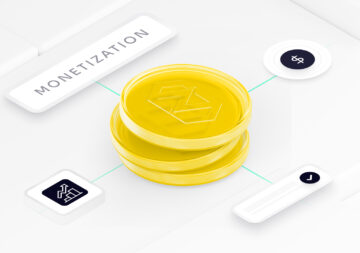The digital advertising landscape evolves with no breaks, and website owners indeed need to constantly seek new (or rather incremental)ways to maximize their content monetization.
With the rise of commerce media, publishers now have access to innovative solutions that allow them to monetize their content sites efficiently and generate steady, incremental revenue.
Read on to discover how to transform your blog or personal website into a profitable venture, offering various monetization strategies tailored to your audience’s interests👇
What is content monetization?
Let’s start with the basics. Content monetization means generating income from the content you create and publish on your website. This can be achieved through various methods, including:
- Selling ad space. By partnering with advertising networks or directly with advertisers to display ads on your website.
- Affiliate marketing. By promoting other companies’ products or services and earning for every click or sale generated through your referral link.
- Sponsored content. By creating content for a brand in exchange for payment.
- Subscription services. By offering exclusive content or access to your website for a recurring fee.
- Selling digital products. By creating and monetizing your expertise and advice.
While creating paid and gated content may not be the optimal strategy for you, incorporating programmatic ads on your website could only bring you benefits. As with all growth strategies, it is highly recommended that publishers create their own custom set of revenue streams, and not stick to just one (most probably Google AdSense).
7 Content Monetization Strategies
In the rapidly evolving digital advertising landscape, content creators and website owners must explore to maximize their revenue potential. With the rise of commerce media, innovative monetization solutions are now more accessible, allowing publishers to diversify their income streams effectively.
Here are seven content monetization strategies that can help you turn your blog or website into a profitable venture:
1. Commerce Media Ads
Commerce media represents a hybrid approach, blending advertising with e-commerce. Platforms like Zeropark enable publishers to integrate relevant product ads directly within their content, enhancing user experience and driving higher conversion rates.
Unlike traditional display ads, commerce media ads are contextually relevant and non-intrusive, making them a seamless addition to your monetization strategy. This approach allows you to leverage advanced algorithms and real-time data to deliver personalized ads, resulting in higher engagement and better revenue potential.
2. Display Advertising
Traditional display ads remain one of the most common ways to monetize content. By partnering with ad networks like Google AdSense or alternative platforms, you can earn revenue every time a user views or clicks on an ad displayed on your site.
While simple to implement, the key to success lies in optimizing ad placement and format to avoid disrupting user experience while maximizing visibility. Let’s treat it more like a starting point of the journey to master publisher monetization.
3. Affiliate Marketing
Affiliate marketing involves promoting products or services relevant to your content and earning a commission on sales generated through your referral links. This strategy works particularly well for blogs or niche websites with a loyal audience. The key is to choose affiliate partners whose offerings align with your audience’s interests, ensuring higher conversion rates and increased revenue.
4. Sponsored Content
Creating sponsored content for brands is another effective way to monetize your website. This strategy involves collaborating with companies to produce content that promotes their products or services. Sponsored posts can take various forms, including reviews, tutorials, or even social media shoutouts. To maintain credibility, it’s essential to ensure that sponsored content is transparent and provides value to your audience.
5. Subscription Models
Offering exclusive content through a subscription model can be a lucrative way to monetize your expertise. This strategy works well for websites with high-quality, specialized content that users are willing to pay for. Whether through a paywall or a membership program, offering premium content can create a steady stream of recurring revenue while fostering a community of engaged subscribers.
6. Selling Digital Products
Monetizing your expertise by selling digital products, such as eBooks, courses, or printables, can be a highly profitable strategy. If you have specialized knowledge or skills that your audience values, packaging this information into a digital product can generate significant income. The key to success is creating products that solve specific problems or fulfill needs within your niche.
7. Native Advertising
Native ads are designed to blend in with the surrounding content, providing a more seamless and engaging user experience. These ads are less intrusive than traditional display ads and often yield higher engagement rates. Platforms like Taboola and Outbrain specialize in native advertising, offering solutions that can be easily integrated into your website to enhance monetization efforts.
By implementing these content monetization strategies, you can diversify your revenue streams, enhance user experience, and create a more sustainable and profitable online business.
Why choose commerce media for content monetization?
While “traditional” content monetization methods like Google AdSense can be effective, they often come with limitations. Advertisers may not always be relevant to your audience, leading to low click-through rates and ultimately, lower revenue. Additionally, cookie-based advertising is becoming increasingly ineffective in a privacy-focused world.
Commerce media offers an alternative, or rather a CPC-based supplement to monetization strategy, providing a unique blend of advertising, e-commerce, and media. This approach allows brands to seamlessly integrate their products and services within your content, creating a more engaging and relevant experience for your audience.
Here are some key benefits of using commerce media for content monetization:
- Higher revenue potential. Commerce media ads typically convert better than traditional display ads, leading to higher revenue for website owners. Google’s sources claim that it’s on average 0.57% on the display network, while some Commerce Media advertisers prove to deliver a steady performance exceeding 8%.
- Improved user experience. Commerce media ads are curated to match your content and audience, resulting in a more engaging and relevant experience for your visitors. In other words – these aren’t just another random display, but rather a high-level ad unit that matches your media type and niche.
- Brand safety and transparency. Commerce media platforms prioritize brand safety and transparency, ensuring that only reputable brands are advertised on your website. They don’t operate on cookies (third-party data), ensuring a safe brand-publisher-visitor match.
- Access to a wider range of advertisers. Connect with a vast network of potential advertisers for more opportunities to monetize your content.
Content monetization in commerce media?
Monetization with commerce content works by embedding relevant product ads directly within your articles, website layout, news, apps and more. The possibilities are really rarely limited, and the full transparency of what type of media our publishers offer, only increases the trust that brands (advertisers) put into commerce media.
As a reminder, Commerce Media advertisers are free to choose their preferred publisher type when launching campaigns, boosting their confidence in the type of audiences that they bid for. Zeropark Commerce Media distinguishes 10 Placement Categories based on the type of media offered by publishers.
You can read more about Zeropark’s introduction of transparent placement categories in our blog article diving deep into the project.
How does commerce media work?
As users engage with your content, they encounter product recommendations tailored to their interests and browsing behavior. This approach not only enhances their experience but also generates revenue for the publisher by seamlessly connecting users with brands they are likely to be interested in.
This is much different from what you typically can access as an Adsense publisher partner. Instead of broader user data (contextual, behavioral, geographic, demographic) used for ad relevance, commerce media partners leverage specific shopping and purchase data, using advanced algorithms and cross-channel information to deliver highly personalized and dynamic ads.
So instead of just engaging users, your platform can directly nurture their purchase decisions, offering a better service to advertised brands. With transparency of performance provided by publishers to campaigns in Zeropark, brands know exactly what platforms to increase their ad budgets for.
Types of commerce media monetization
There are different types of formats when it comes to content monetization within commerce media ecosystems. They include:
- In-text affilaite links
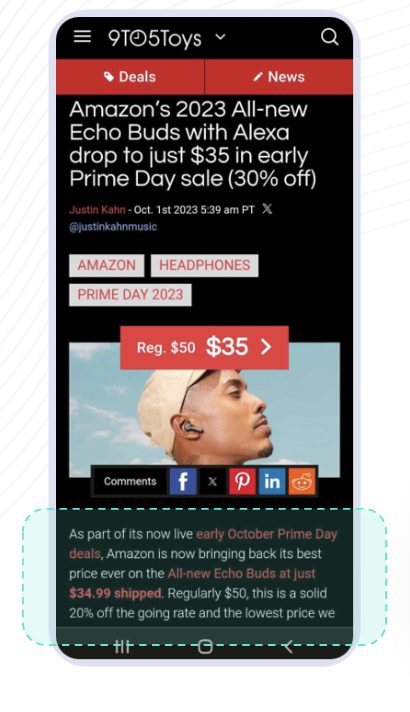
With in-text ad placements, you can use editorials, news, reviews, blogs, and all content types to link brand advertisers or merchant offers and monetize your user engagement!
- Interactive product listings
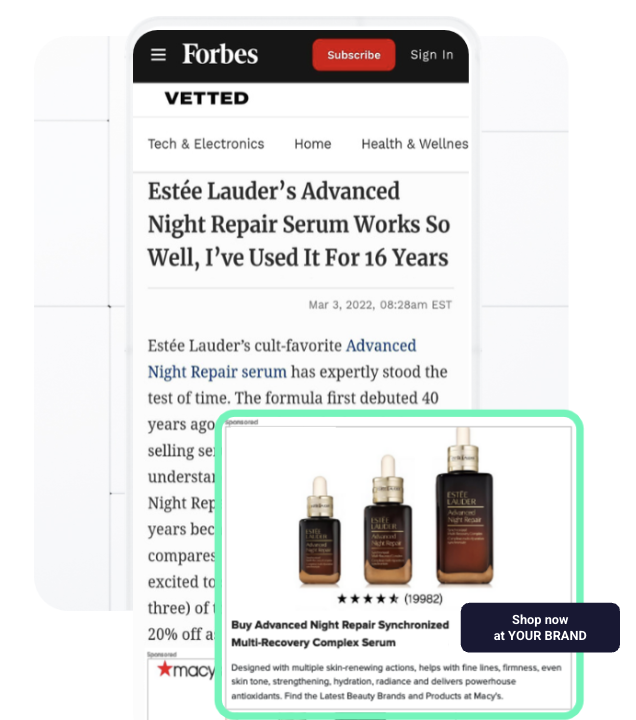
Use Commerce Media to nurture your site with product recommendations and product listing ads that will support the nature of your content. They (also known as PLAs) offer the best match between ad unit and publisher content, supporting all in-text arguments contextually.
- In-text banners
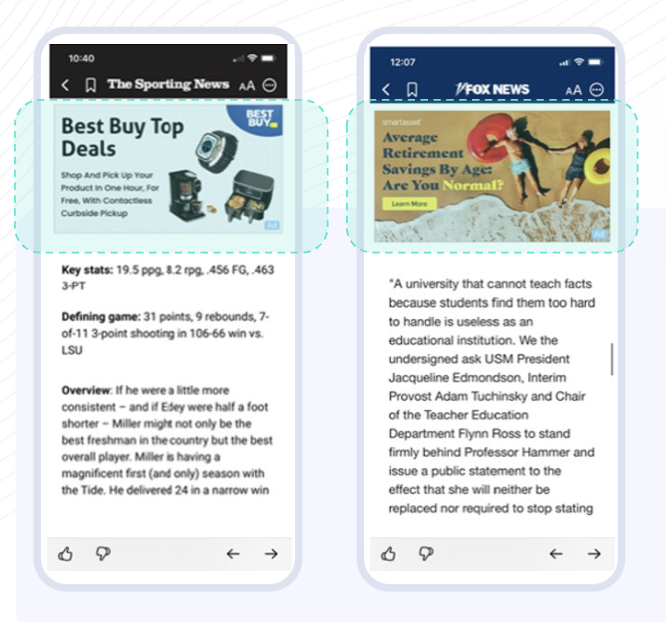
The most popular ad units for blogs and content sites are banners and pop-ups. They can be very efficient and drive an incredible number of sales to brands, but even this ad type has to be approached with an understanding of industry nuances.
- Affiliate links
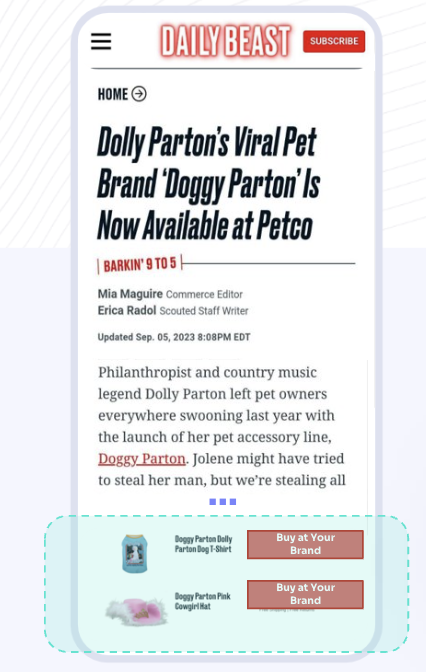
Publishers come up with many ways to implement their affiliate links to the content. They can support the articles not only by being placed in-text, but also as part of attractive product displays that entice readers to interact with brand offers!
Content Monetization Platforms
To effectively monetize your content, selecting the right platform is crucial. Different platforms offer unique features and benefits, tailored to various types of content and audience engagement strategies. Below, we explore some of the leading content monetization platforms that can help you generate revenue from your website, blog, or digital media.
1. Zeropark Commerce Media
Zeropark Commerce Media stands out as a powerful platform for publishers looking to integrate commerce-driven advertising into their content. By leveraging advanced algorithms and contextual data, Zeropark enables seamless embedding of product ads directly within your content.
This not only enhances user experience but also drives higher conversion rates by delivering highly relevant and personalized ads.
2. Adsolutely
Adsolutely is an emerging monetization platform that focuses on delivering personalized and high-performing ads tailored to the needs of publishers and their audiences. With an emphasis on contextual relevance and user engagement, Adsolutely provides a suite of tools that help optimize ad placements across different content types.
It’s particularly suitable for publishers looking to integrate innovative ad formats and maximize their monetization potential while maintaining a positive user experience.
3. Google AdSense
Google AdSense is one of the most popular and widely used content monetization platforms. Known for its ease of integration and vast network of advertisers, AdSense allows publishers to earn revenue by displaying targeted ads on their websites.
4. Taboola
Taboola specializes in content recommendations. Publishers can integrate native ads that blend seamlessly with their content, providing a more engaging experience for users. The platform’s advanced targeting capabilities allow advertisers to reach highly specific audiences, leading to better performance and higher earnings for publishers.
5. Skimlinks
Skimlinks is a popular affiliate marketing platform that simplifies the process of monetizing content through affiliate links. The platform automatically converts product links within your content into affiliate links, allowing you to earn a commission on sales generated through your site. Skimlinks partners with a wide range of merchants and offers publishers access to lucrative affiliate programs without the need to manually create and manage links. This makes it an excellent choice for content creators focused on product reviews, guides, and other commerce-related content.
How to add commerce media ads for content monetization?
Fortunately, it’s a straightforward process that does not require much effort on publisher part.
- Sign up and create an account with commerce media ad exchange like Zeropark.
- Connect your website. Integrate your website with the platform to enable ad delivery.
- Choose your monetization strategy.
- Monitor, optimize, and earn. Track your performance and make adjustments to maximize your revenue. Launch steady advertising to monetize all the clicks that you provide for brand advertisers.
Additional tips for successful content monetization
Beyond choosing the right monetization strategy, here are some additional tips to help you maximize your website’s earning potential:
- Focus on creating high-quality content. The foundation of successful content monetization is valuable content that resonates with your audience.
- Understand your target audience. Knowing your audience’s interests and demographics will help you create the best content for them.
- Diversify your income streams. Don’t rely on a single source. Taking advantage of incremental solutions provides you with steadiness of income and financial security.
- Stay up to date on the latest trends. The world of content monetization is constantly evolving. It’s good to stay informed about new trends and opportunities!
Embracing the future of publisher monetization
Commerce media model represents a promising path forward for publishers seeking to maximize their monetization potential. By leveraging the power of commerce-driven content and partnering with innovative platforms like Zeropark, you can unlock new revenue streams, foster deeper audience engagement, and ultimately, achieve sustainable growth for your online business.
Gabriela Cendrzak


